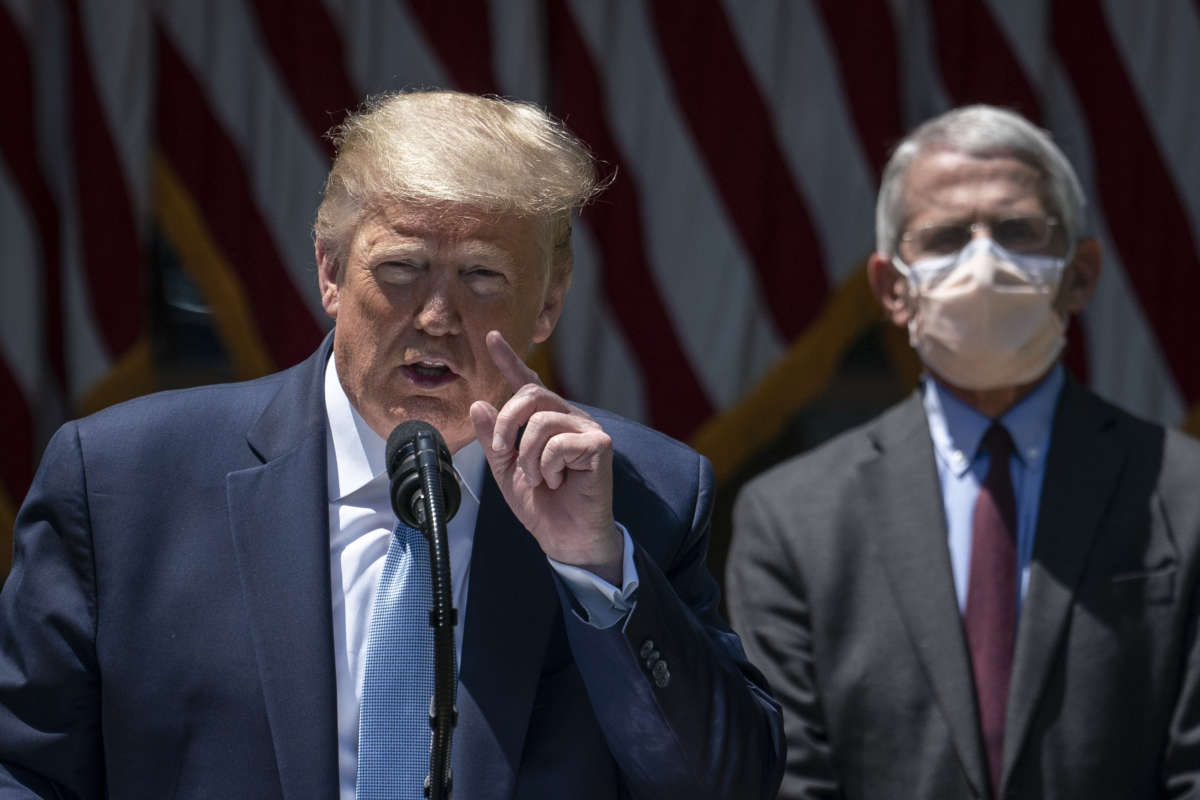Did you know that Truthout is a nonprofit and independently funded by readers like you? If you value what we do, please support our work with a donation.
Speaking at a political rally in Swanton, Ohio, on Monday evening, President Trump wrongly claimed that COVID-19 is a disease that only affects the elderly and urged schools to reopen their doors by arguing that “virtually nobody” young is affected by it.
“It affects elderly people. Elderly people with heart problems and other problems,” Trump said to the crowd. “If they have other problems that’s what it really affects, that’s it. You know in some states, thousands of people — nobody young.”
He also said that young people have “a hell of an immune system” that helps them fend off the coronavirus better.
“It affects virtually nobody” who is young, Trump declared. “It’s an amazing thing.”
“By the way, open your schools,” he added.
The comments by the president are inaccurate and dangerous: Plenty of young people are affected by the disease, although not at the same rate as older people. And though the mortality rate among the young is low, several children have died from COVID as well.
Indeed, from March through July, more than 500 kids under the age of 18 were hospitalized because of coronavirus. From the start of the pandemic through September 16, more than 60 children 14 years of age and younger have died from COVID, and hundreds of young people between the ages of 15 and 24 have also succumbed to the disease so far.
Overall, based on incomplete data that it was able to collect from states, the American Academy of Pediatrics reports that at least 587,000 children have been diagnosed with coronavirus since the start of the pandemic.
It appears that in-person instruction at schools might be playing a role in increasing the spread of the virus. From September 3 to 17, at least 74,553 new cases of infections among children had been identified. This is a 15 percent increase in infections among young people compared to the previous two-week period.
Experts caution that the long-term effects of COVID-19 among children are not yet known. New studies and a better understanding of this coronavirus have also suggested that children play a bigger role than once thought in the spread of infections. This makes reopening schools a risky endeavor, particularly for family members who may come into contact with children who may be carrying the virus without exhibiting any symptoms.
The message to take coronavirus seriously, however, appears to be largely ignored by a substantial segment of Trump’s base of support, which was noticeable on Monday night. Earlier in the evening, before Trump took the stage, Ohio Lt. Gov. Jon Husted, a Republican, spoke to the audience, encouraging them to wear masks. His request was received with boos from the audience despite his pointing out that the mask he was wearing was in support of the president’s reelection.
During an interview on Monday evening on “The Daily Show,” Anthony Fauci, a member of the White House’s coronavirus task force and the leading expert on infectious diseases in the U.S., was asked about some Americans’ refusal to take the disease seriously. He called such resistance toward simple, scientifically proven methods to combat the coronavirus as problematic toward the overall goal of stopping its spread.
“One of the things that I think gets in the way is that we are in such a divisive state in society that it tends to get politicized,” Fauci said to host Trevor Noah. “It’s almost one side versus the other.”
He disparaged the idea of people taking “sides” on the issue, adding that the situation is “totally unfortunate because this is a purely public health issue,” not a political one.
“When I’m telling you wear a mask, keep social distancing, avoid crowds, wash your hands, do things outdoors more than indoors, there’s nothing political about that,” Fauci explained. “That’s a public health message that we know works.”
Speaking against the authoritarian crackdown
In the midst of a nationwide attack on civil liberties, Truthout urgently needs your help.
Journalism is a critical tool in the fight against Trump and his extremist agenda. The right wing knows this — that’s why they’ve taken over many legacy media publications.
But we won’t let truth be replaced by propaganda. As the Trump administration works to silence dissent, please support nonprofit independent journalism. Truthout is almost entirely funded by individual giving, so a one-time or monthly donation goes a long way. Click below to sustain our work.
